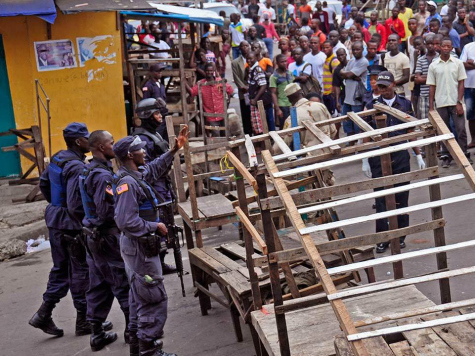(AFP) US troops deployed to West Africa to fight the Ebola outbreak could stay up to a year, depending on how quickly the virus can be contained, a top general said Tuesday.
The head of the US military’s Africa Command, General David Rodriguez, also rejected criticism that the American response to the crisis has been too slow, saying the troop deployment had to be designed to take into account Liberia’s limited infrastructure.
About 350 US troops have arrived in Liberia and Senegal so far as part of a 3,200-strong force due to help with logistical support, training for health workers and mobile test labs.
Asked how long American troops would remain in the region, Rodriguez told reporters: “I’m sure it’ll be about a year … at this point, but that’s just a guess.”
He said that “we’ll have to play that by ear” and see how fast transmission rates decline.
US government experts believe that if 70 percent of patients infected with Ebola could be moved to treatment facilities, the spread of the virus could be curtailed, the four-star general said.
US forces in Monrovia have established a headquarters to oversee the mission and set up several mobile medical labs to increase “the capacity for rapidly diagnosing Ebola,” he said.
Washington’s effort is aimed at “containing the epidemic at its source.”
Rodriguez vowed to ensure that US troops heading to Liberia would undergo special training, wear protective gear and work under “strict” medical protocols to avoid contracting the deadly virus.
The general suggested some soldiers would have contact with Ebola patients but later clarified his remarks, saying a small number of highly-trained medical experts would handle blood samples in testing labs but not patients.
The labs, manned by service members from the US Naval Medical Research Center, can process up to 100 samples a day.
– Limited infrastructure slowing rollout –
Critics and some aid workers have accused President Barack Obama’s administration of moving too slowly in response to the epidemic, questioning why it is taking weeks to deploy troops.
Rodriguez, however, said the pace was dictated in part by Liberia’s limited infrastructure and that moving too many troops too quickly would be counter-productive.
He said the cost of the military’s mission was about $750 million so far.
In addition to American troops, more than 130 civilian experts from US government agencies have traveled to the region to help counter the outbreak.
The US government had distributed more than 10,000 Ebola test kits to Liberia and Sierra Leone, plastic sheeting for treatment facilities and planned to deliver 140,000 sets of personal protective equipment, the White House said.
The head of the US Agency for International Development, Rajiv Shah, issued a call Tuesday to scientists and “innovators” around the world to submit ideas on how to improve the protective gear and tools used by health workers fighting Ebola.

COMMENTS
Please let us know if you're having issues with commenting.